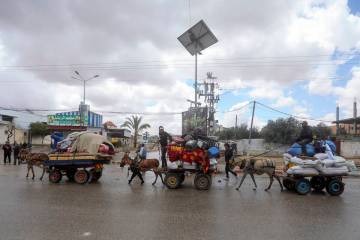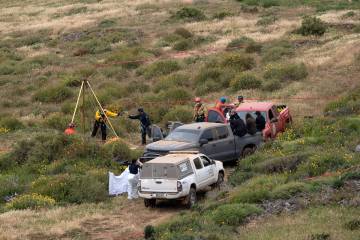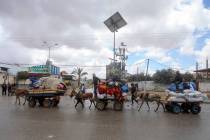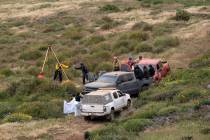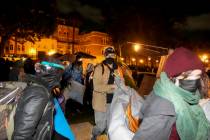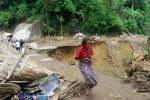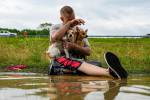Disasters have many thinking of living simpler, without stuff
As Hurricane Irma barreled toward Florida last month, Stephanie Kurleman and her family packed up three cars and evacuated to a friend’s home. “I thought I wouldn’t come back to anything,” Kurleman said, recalling the moment her family drove away from Clearwater Beach. In addition to the basics, she said they gathered documents, photos, her Bible, jewelry, plus the kids’ kiteboards.
When the storm passed, they drove back and found only minor damage. But the experience left Kurleman with an urge to purge. “I was weighed down by too much stuff,” Kurleman, 50, said. “I was prepared to start over with what I had with me,” she said, adding: “I could live simpler.”
In the past two months, thousands of homes in Texas, Florida, Puerto Rico, Mexico and California have flooded, flattened or caught fire. In a matter of hours or days, homes that took lifetimes to fill with furniture, clothing, technology, sports equipment, photo albums and family videos were reduced to waterlogged or charred debris.
The media spotlight on people who’ve lost large chunks of their lives may be stirring up aftershocks. Americans, even those outside the disaster zones, are starting conversations about how much stuff they have — and what they really need.
Organizing and decluttering are national obsessions. But rather than taking the time to wade through their things, many get more joy out of watching cable shows on closet cleaning, buying plastic tubs at the Container Store and reading Marie Kondo’s books. They contemplate re-evaluating the mountains of stuff in their garages, attics and basements. But many don’t even have enough room in their homes for everything they want to keep: Almost 10 percent of American households have a storage unit, according to the Self Storage Association.
Cris Sgrott-Wheedleton, a professional organizer in Virginia, has noticed a higher call volume at her office since the spate of natural disasters. “I think the coverage has affected people. People are ready to begin the process. It reminds them to think, ‘What do I have in my house and how would I gather those things and put them in my car and leave?,’ ” she says.
Watching people who have lost everything can prompt a spiritual change or a value shift, according to Marjorie Kukor, an Ohio psychologist who has been a mental health volunteer for local and national disasters. “They might realize that it’s not the material things that are important to them,” Kukor says.
Still, Sgrott-Wheedleton calls the relationship of people with their stuff “complex.” “I work with people who say they wish they could throw a match at their piles of stuff and let it all burn down and start fresh somewhere else. But do they really mean that?” she says. Making time-consuming decisions about what to keep and what to let go is a difficult and emotional process.
“We hold on to stuff because of what we believe it says about us,” says Regina Lark, a professional organizer in Los Angeles. A Gen-Xer might keep her grandparents’ china even though she never uses it, but it keeps her connected to her family story. A baby boomer might still have T-shirts from every 1970s concert he attended, proving he’s not just a boring office drone, but an office drone who’s lived. On top of the memories of the past are uncertainties about the future. What might be useful someday? That question can keep a scholar from tossing decades-old notes; they might be the basis for a great book.
Often people fail to focus on what’s really important to them until it’s too late. A few days before Irma hit, Jodeen Krumenauer and husband John Sweet packed a few suitcases and computer bags and evacuated from their one-story house in a flood zone in Bonita Springs, Florida.
When they returned 12 days later, fish were swimming in the four inches of water that filled every room of their house.
They hadn’t anticipated this level of damage. “We just packed as though we were leaving for a trip. I brought a box of insurance papers and birth certificates. And some electronics,” says Krumenauer, 50. Fortunately, at the last minute, she also threw in some old photos and a bit of jewelry that had belonged to her grandmother who had died earlier this year.
When they returned, the water and mildew had ruined most of their furniture and other possessions. She threw clothes that were not moldy into a bag and saved some kitchen accessories. The stuffed animals had to go. She lost family mementos and drawings she had made. “That was hard,” she says.
The whole process of rebuilding is messy and long. They are reevaluating everything. “We will think more about what it is we are buying. Do we really need this? But I can also see going the opposite way and thinking you want more things to make up for what you lost. But I don’t want to do that. I would like to live a life with less stuff.”
Amy Nitza, director of the Institute for Disaster Mental Health at SUNY New Paltz, says losing everything in a disaster usually becomes a defining bench mark in someone’s life. “It can cause a reappraisal of what life is about,” she says.
The recent spate of hurricanes, earthquakes and fires means that “people, for good or bad, are having vicarious reactions to what they are seeing,” Nitza says. She cited a 2015 survey that found that only 22.9 percent of Americans indicated they had an emergency preparedness plan. Nitza says that even those who haven’t been directly affected by a hurricane or wildfire might be inspired “to be prepared in a way they might not have been before having this vicarious reaction.”
Geoffrey and Sarah Cocks, both 68, fall into that category. A year ago, the couple downsized from a 2,500-square-foot home in Michigan to a smaller place in Carmel, California. Geoffrey, a retired history professor, thought it would be hard to give up his books but realized the tomes would be of greater benefit to a library. The couple said their pre-move decluttering was cathartic.
Now they are focused on a different kind of packing. This month, their daughter, her husband and their two cats had to quickly leave their Napa, California house before it was consumed by fire. Their daughter’s sudden loss moved the Cockses to pack go-bags, complete with flashlights, batteries, cash, sturdy shoes, water, granola bars and rain jackets so they could be ready to leave at a moment’s notice.
This tragedy “made us realize that whatever stuff we had can eventually be replaced,” Sarah Cocks says. “Getting out with your life and your animal companions is more important.”




